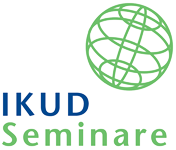A modular Train the Trainer course for Intercultural Trainers
IKUD® Seminare have been offering a practice-oriented Train the Trainer course for intercultural trainers, audited and certified by the German Association for the Quality of Intercultural Training (Deutsche Gesellschaft für interkulturelle Trainingsqualität e.V., dgikt), since Autumn 2006. To date, more than 450 individuals have successfully obtained their qualification as Intercultural Trainers (m/f).
This training will equip you with the essential theoretical and practical competences you need to organise and implement intercultural trainings yourself. In contrast to other comparable training courses, a particular emphasis of this course lies on assisting you to develop your own training programme. You thereby gain a considerable advantage over your competitors, since on finishing this course you are already equipped with suitable materials and ready-designed training modules which you can use in trainings of your own.
Participants
Our Train the Trainer course is designed for persons who are working, or are planning to work, as intercultural trainers, coaches or consultants. It also addresses employees resp. staff of businesses, organisations and institutions of higher education, whose work lies in the field of intercultural education, as well as persons working in the areas of Human Resources or Diversity Management. The course is also open to start-up entrepreneurs, business executives and any other individuals who wish to obtain a qualification in the field of intercultural education.
IKUD® Seminare is a private educational institution officially accredited according to the Accrediting and Certification Regulations of Employment Promotion AZAV (Akkreditierungs- und Zulassungsverordnung Arbeitsförderung), and an accredited and certified provider of training and qualifications (§ 1 (2) in conjunction with §§ 9-11 IQVO) verified by the Institute for Quality Development in Wiesbaden (Institut für Qualitätsentwicklung Wiesbaden).
The training course “Intercultural Trainer: Training in 5 Modules” has been certified by the German Association for the Quality of Intercultural Training (Deutsche Gesellschaft für interkulturelle Trainingsqualität e.V. (dgikt)). Upon completion of this course, participants receive a qualification as a “Certified Trainer of the German Association for the Quality of Intercultural Training”.
Contents
Module 1: Core Competences
Duration: Two days
Effective adult and continuing education means more than just the imparting of information. Learning is a holistic process which places high demands on the instructor. Intercultural trainers in particular are faced with special challenges when it comes to the transfer of knowledge, owing to their target groups‘ often diverse cultural learning patterns and backgrounds. For this reason, this module focuses on didactic principles and the basics of efficient knowledge transfer, always in relation to an intercultural context. The main topics include:
- Overview of the most important theories of intercultural training / learning
- “Toolbox” of an intercultural Trainer (m/f)
- (Didactic) principles of intercultural communication
- Specific topics (short presentations)
- Practical exercises
Module 2: Transfer to practical application
Duration: One day
In this module participants reflect their newly-gained experiences on two levels: that of participant and trainer. This doubling of perspective intensifies the learning process. Focal topics are:
- Overview of the different methods of intercultural training
- Introduction to the theoretical and practical foundations of intercultural training and intercultural communication
- Practical exercises for the various methods, including questionnaires, analysis of critical incidents, the Culture Assimilator, case studies, communication exercises and simulations
- Practical instructions on how to apply the training methods
- Different methods and media and when/how to use them
Modules 1 and 2 are scheduled as one teaching block, as the practical application of the material is immediately integrated into the theoretical framework.
Module 3: Designing Intercultural Training Modules
Duration: Three days
The subject of the third module is the development of training modules and programmes for specific target groups. Competences in programme design and development are a prerequisite for trainers and coaches who wish to work in the intercultural sector, just as these abilities are increasingly expected of employees in the context of their organisations, businesses, or projects. It is therefore important that participants should engage with the conceptual design of such courses and programmes. They learn how to:
- plan training units based on realistic training objectives,
- adapt their trainings to suit specific target groups and requirements,
- incorporate creative and motivational elements into their trainings and
- make their trainings economical and efficient to implement.
This module provides you with the necessary theoretical background knowledge by introducing the central academic models of culture / approaches to describing culture(s): Cultural Standards, Culture Dimensions and cultural orientations, as well as the findings of the international GLOBE Study. These provide a central basis for the practical implementation and design of intercultural trainings. The programme is supplemented by the following aspects:
- Introduction to designing intercultural trainings
- Presentation of prototypes for intercultural training modules
- Designing trainings for different target groups
- Provision of selected and established training materials
In Module 3, ideas for trainings, courses and programmes are developed and elaborated, either alone or with partners working in the same field. In this process, participants receive methodic guidance, particularly regarding the following points:
- Target group analysis,
- Analysis of requirements, competencies and learning objectives,
- Design and organisation of training module sequences,
- Selection and development of training methods and materials,
- Possibilities for integrating E-learning into the programme and
- Programme evaluation.
Participants receive training materials as a basis from which to develop their own trainings, as well as an extensive handout containing the main Cultural Standards of selected regions, an analysis and detailed presentation of the Culture Dimensions and the main results of the international GLOBE Study.
Module 4: Designing Training Elements
Duration: Three days
This module focuses particularly on simulations, role play and case study methods.
Role play and simulations are among the most efficient methods of intercultural training and are designed either with a specific culture in mind or as a general cultural training exercise. They promote affective and behavioural aspects of intercultural competence by releasing emotions and by addressing and training patterns of behaviour.
Module 4 consists of two units: the first unit consists exclusively of the presentation and implementation of simulations and role play, while the second unit foregrounds the development of the participants‘ own designs. The contents of the module are as follows:
First Unit
A short introduction to the topic is followed by the presentation and implementation of some established simulation games (including Barnga, KultuRallye, Modis & Trados). Further training and communication exercises and games are available to participants in our extensive collection of training materials.
Second Unit
The participants form small groups and, with guidance from the instructors, develop their own concepts for simulation games and case study methods suited to the requirements of their own target groups and institutions. The didactic methods needed for the implementation of the developed material are presented in a clearly arranged manner. An information table with additional theoretical and practical resources is available during breaks.
Module 5: Evaluation and Certification
Duration: Two days
In the last module participants present the training modules they have developed over the course of the training. The participants‘ presentations of their projects are followed by feedback and evaluation tips, as well as by a detailed final summary. The module also includes a discussion of steps and strategies for practical implementation (developing a profile, SWOT-analysis, strategy, innovation potential, concept, marketing).
The seminar finishes with an evaluation (objectives, functions, methods, levels) and participants who have successfully obtained their qualification receive the accredited certificate “Intercultural Trainer (m/f)”.
Organisation
Duration: 11 full training days plus ca. 20 hours of task-based learning.
Dates: by request
Location: Göttingen
Number of participants: max. 12
Trainers: Alexander Reeb M.A. and Rucha Ambekar M.A. (about the instructors)
Seminar fee:
3.780 € (for-profit sector)
3.480,– € (private individuals, non-profit organisations, NGOs, universities / higher education institutions and public administration)
In accordance with §4 Nr. 21 a)bb) UStG (Value Added Tax Act – Germany), this fee is exempt from sales tax.
Beverages, snacks and seminar documents are included.
Each participant receives a handout for each module with all materials presented. An extensive collection of books, films and other illustrative material is provided for self-study during breaks. Additional information is made available through an E-learning module. All presented materials may later be used by the participants for their own trainings, with appropriate copyright references.
We look forward to welcoming you on this training course.
Currently only available in German. For additional information please see our German homepage: Interkultureller Trainer: Ausbildung in 5 Modulen.
If you wish to book this course as an inhouse seminar, please use the contact form.
You are reading: Certified Intercultural Trainer: Training in 5 Modules

 © Stefan Körber /Fotolia
© Stefan Körber /Fotolia




